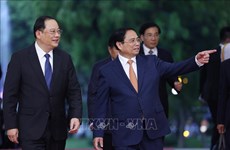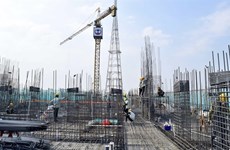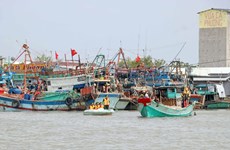Vietnam attractive to Japanese investors: JETRO
Japanese businesses are looking closely at the investment environment
in Vietnam and consider it an attractive market, according to
Atsusuke Kawada, Chief Representative of the Japan External Trade
Organisation (JETRO) in Vietnam.
Japanese businesses are looking closely at the investment environment
in Vietnam and consider it an attractive market, according to
Atsusuke Kawada, Chief Representative of the Japan External Trade
Organisation (JETRO) in Vietnam.
According to Kawada, about 2,000 Japanese firms are operating in Vietnam and Japanese direct investment flow into the country in 2013 exceeded 5.7 billion USD.
A recent survey conducted by the JETRO revealed that up to 70 percent of Japanese businesses plan to expand their operations in the Southeast Asian country.
The survey also found that the country surpassed larger competitors like Indonesia, Thailand and the Philippines in the race to lure Japanese investment.
Most of the questioned Japanese businesses highly valued Vietnam’s growth potential, social and political stability, and low-cost labour force.
Many companies plan to build more factories in Vietnam and expand their operations outside major industrial parks, said Kawada.
He said the number of visitors to the page on Vietnam on the JETRO website, which provides information about countries worldwide, is equal to that of Thailand , and only second to China.
Vietnam also ranks second among ASEAN countries, after Thailand , in terms of membership of the Japanese business association, Kawada added.
The country holds an important position in the ten-member group, he said, noting that most of the Japanese businesses operating in Vietnam regard the country as a bridge to further their reach in the bloc.
Notably, low-cost labour is one of Vietnam’s advantages, with each worker receiving 3,000 USD per year on average in 2013, one eighth of what Japanese companies pay their employees in Singapore and half what they pay in Thailand.
Japanese businesses currently focus their investment on the processing and production on small and medium scale, but they also have their eyes on the high-tech sector.
Dr. Nguyen Dang Minh from Vietnam National University – University of Economics and Business, said the strong performance of Japanese businesses reflects Vietnam’s favourable and suitable business climate.
This is an opportunity for Vietnam to compete with others in the region to acquire Japanese investment, he said.
However, Minh also proposed Vietnam create more preferential policies, especially in tax, to raise the country’s competitive edge while improving its infrastructure system.
He underlined the need for the country to establish a national programme on attracting Japanese investment and organise more exchanges for the two countries’ businesses.
Vietnamese labourers should be equipped with not only technical and language skills but also understanding the Japanese business culture, he said.
Kawada also suggested Vietnam places more importance on the support industry, adding that Japanese experts have provided technical support and share experience with Vietnam in this field.
The JETRO has made a list of outstanding Vietnamese businesses operating in the area to introduce to Japanese firms, thus helping them establish connections, he said.
According to statistics released by the Foreign Investment Agency under the Ministry of Planning and Investment, there were 2,103 Japanese-invested projects worth a total of 34.5 billion USD in Vietnam in 2013.
With the amount of added capital climbing from 1.2 billion USD in 2012 to 4.5 billion USD in 2013, Japan maintains its number one position among 100 countries and territories investing in Vietnam.-VNA
According to Kawada, about 2,000 Japanese firms are operating in Vietnam and Japanese direct investment flow into the country in 2013 exceeded 5.7 billion USD.
A recent survey conducted by the JETRO revealed that up to 70 percent of Japanese businesses plan to expand their operations in the Southeast Asian country.
The survey also found that the country surpassed larger competitors like Indonesia, Thailand and the Philippines in the race to lure Japanese investment.
Most of the questioned Japanese businesses highly valued Vietnam’s growth potential, social and political stability, and low-cost labour force.
Many companies plan to build more factories in Vietnam and expand their operations outside major industrial parks, said Kawada.
He said the number of visitors to the page on Vietnam on the JETRO website, which provides information about countries worldwide, is equal to that of Thailand , and only second to China.
Vietnam also ranks second among ASEAN countries, after Thailand , in terms of membership of the Japanese business association, Kawada added.
The country holds an important position in the ten-member group, he said, noting that most of the Japanese businesses operating in Vietnam regard the country as a bridge to further their reach in the bloc.
Notably, low-cost labour is one of Vietnam’s advantages, with each worker receiving 3,000 USD per year on average in 2013, one eighth of what Japanese companies pay their employees in Singapore and half what they pay in Thailand.
Japanese businesses currently focus their investment on the processing and production on small and medium scale, but they also have their eyes on the high-tech sector.
Dr. Nguyen Dang Minh from Vietnam National University – University of Economics and Business, said the strong performance of Japanese businesses reflects Vietnam’s favourable and suitable business climate.
This is an opportunity for Vietnam to compete with others in the region to acquire Japanese investment, he said.
However, Minh also proposed Vietnam create more preferential policies, especially in tax, to raise the country’s competitive edge while improving its infrastructure system.
He underlined the need for the country to establish a national programme on attracting Japanese investment and organise more exchanges for the two countries’ businesses.
Vietnamese labourers should be equipped with not only technical and language skills but also understanding the Japanese business culture, he said.
Kawada also suggested Vietnam places more importance on the support industry, adding that Japanese experts have provided technical support and share experience with Vietnam in this field.
The JETRO has made a list of outstanding Vietnamese businesses operating in the area to introduce to Japanese firms, thus helping them establish connections, he said.
According to statistics released by the Foreign Investment Agency under the Ministry of Planning and Investment, there were 2,103 Japanese-invested projects worth a total of 34.5 billion USD in Vietnam in 2013.
With the amount of added capital climbing from 1.2 billion USD in 2012 to 4.5 billion USD in 2013, Japan maintains its number one position among 100 countries and territories investing in Vietnam.-VNA












